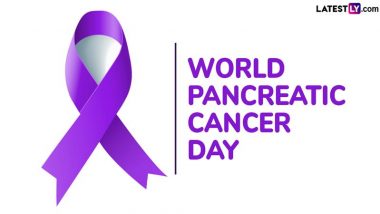World Pancreatic Cancer Day is celebrated on the third Thursday of November, which in 2024 will fall on November 21. The event was established by the World Pancreatic Cancer Coalition (WPCC) in 2014. This coalition is a global alliance of organisations, medical professionals, and researchers committed to increasing awareness about pancreatic cancer, improving outcomes, and funding critical research into better treatment options. November 2024 Festivals, Events and Holidays Calendar: Complete List of Important National and International Days and Dates.
World Pancreatic Cancer Day 2024 Date and History
World Pancreatic Cancer Day 2024 is on November 21. The history of World Pancreatic Cancer Day is tied to the need for greater attention to this often-overlooked disease. Pancreatic cancer is one of the least funded cancer types despite its devastating impact. The event seeks to bridge this gap by providing a unified platform for individuals and organisations to raise their voices, advocate for better treatment options, and fund research that could lead to breakthroughs in diagnosis and therapy.
World Pancreatic Cancer Day Significance
The significance of World Pancreatic Cancer Day lies in its ability to amplify the conversation around a cancer that is frequently diagnosed too late for effective treatment. Pancreatic cancer has one of the lowest survival rates among all cancers, largely because it is often asymptomatic in its early stages. Symptoms, when they do appear, are often vague, including unexplained weight loss, jaundice, and abdominal pain, making early detection challenging.
By marking this day, the World Pancreatic Cancer Day campaign encourages people to recognise symptoms early, seek medical attention when necessary, and raise awareness within communities. The day also emphasises the importance of research funding to support innovations in early detection methods and the development of more effective treatments.
Additionally, World Pancreatic Cancer Day provides an opportunity for patients, families, and survivors to share their experiences, helping to humanise the disease and connect people who may feel isolated by their diagnosis. It also serves as a reminder of the urgent need for a cure and the importance of public health policies that prioritise cancer research and funding.
What Is Pancreatic Cancer?
Pancreatic cancer begins in the cells of the pancreas, an organ located behind the stomach that plays a key role in digestion and insulin regulation. The most common type of pancreatic cancer is pancreatic adenocarcinoma, which accounts for about 95% of all cases. Unlike other cancers, pancreatic cancer does not usually cause noticeable symptoms in its early stages, which is why it often goes undiagnosed until it has reached an advanced stage.
One of the most significant challenges with pancreatic cancer is its poor prognosis. According to statistics, the five-year survival rate for pancreatic cancer is only around 10%, making it one of the deadliest cancers globally. The lack of early symptoms and effective screening methods contributes to its high mortality rate. Risk factors include age, smoking, family history, chronic pancreatitis, and certain genetic mutations. Despite its grim outlook, ongoing research into treatments such as immunotherapy, targeted therapy, and early detection methods holds promise for improving survival rates in the future.
(The above story first appeared on LatestLY on Nov 17, 2024 03:36 PM IST. For more news and updates on politics, world, sports, entertainment and lifestyle, log on to our website latestly.com).













 Quickly
Quickly





















